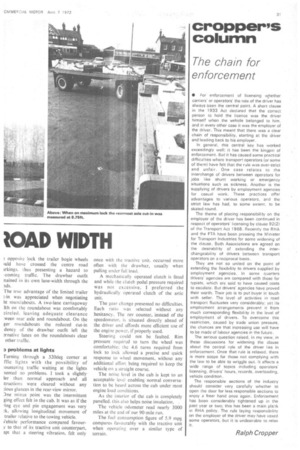cropper's column
Page 33

If you've noticed an error in this article please click here to report it so we can fix it.
The chain for enforcement
• For enforcement of licensing whether carriers' or operators' the role of the driver has always been the central point. A short clause in the 1933 Act declared that the correct person to hold the licence was the driver himself when the vehicle belonged to him, and in every other case it was the employer of the driver. This meant that there was a clear chain of responsibility, starting at the driver and leading back to his employer.
In general, this central key has worked exceedingly well; it has been the kingpin of enforcement. But it has caused some practical difficulties where transport operators (or some of them) have felt that the rule was over-strict and unfair. One case relates to the interchange of drivers between operators for jobs like shunt working or emergency situations such as sickness. Another is the supplying of drivers by employment agencies for casual Work. These practices offer advantages to various operators, and the strict law has had, to some extent, to be skated round.
The theme of placing responsibility on the employer of the driver has been continued in respect of operators' licensing by clause 92(2) of the Transport Act 1968. Recently the RHA and the FTA have been pressing the Minister for Transport Industries for some widening of the clause. Both Associations are agreed on the desirability of extending the interchangeability of drivers between transport operators on a reciprocal basis.
They are not so united on the point of extending the flexibility to drivers supplied by employment agencies. In some quarters drivers' agencies are compared with those for typists, which are said to have caused costs to escalate. But drivers' agencies have proved their worth. Their job is to put buyer in touch with seller. The level of activities in road transport fluctuates very considerably: yet its employment arrangements prevent it from much corresponding flexibility in the level of employment of drivers. To overcome this restriction, caused by trade union pressure, the chances are that increasing use will have to be made of labour agencies in the future.
The serious question raised, in my view, in these discussions for widening the clause about the central role of the driver lies in enforcement Once that rule is relaxed, there is more scope for those not complying with the law to be able to wriggle out. It affects a wide range of topics including operators' licensing, drivers' hours, ecords, overloading, vehicle condition.
The responsible sections of the industry should consider very carefully whether to open the door for less responsible sections to enjoy a freer hand once again. Enforcement has been considerably tightened up in the past year or two; this has been a main plank in RHA policy. The rule laying responsibility on the employer of the driver may have vexed some operators, but it is undesirable to relax it.
Ralph Cropper




















































































